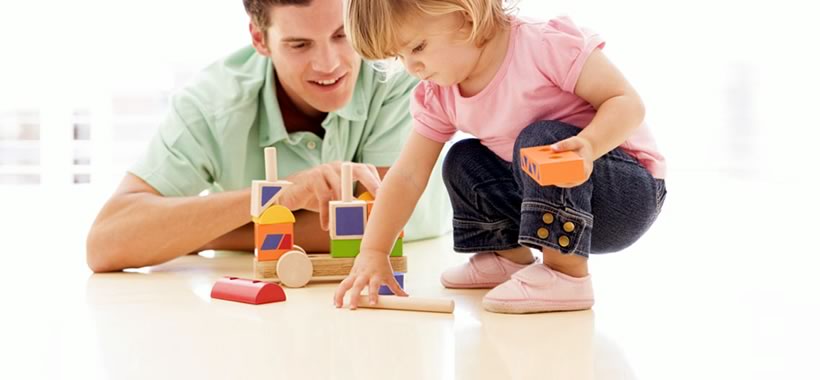The toddler sees a car and speaks his first word: "automobile." But what happened before? Experts explain how foundations for speaking are laid early on

Babies want to communicate with adults through facial expressions
If it on the subject Talking, newborns are quite stubborn. "You want to learn to speak. And they do a lot to make it work", says Prof. Dr. Ulrike Lüdtke, who teaches and researches at the Institute for Special Education at Leibniz University Hannover. The tiny people’s thirst for knowledge and the joy of hearing language become apparent right after birth: "Children are far from being the passive beings that many consider them to be. Already in the first few hours they get their counterpart to communicate with them", says Lüdtke. At first, it was delicate and with signals that adults did not immediately understand. But the message is: talk to me!
Babies look at the facial expressions
Learning is not yet about words. In the beginning, the facial expression of the other person is important. This tells newborns that mom and dad are reacting to them. A first step towards language acquisition. If there is no reaction from the other person, the little ones can react with extreme irritation.
In experiments, mothers were asked to keep their facial expressions as rigid as possible when they approached their baby. To this "Still-Face experiments" all the little ones reacted "very disturbed", explains researcher Lüdtke. They grimaced, cried – trying to get the big ones to communicate with them. Only when the mothers moved their faces again did the children appear satisfied.

Learning to speak is only possible with a caregiver
If you want to teach to speak, you have to feel. Roughly speaking, that is Hannelore Grimm’s message. The emeritus professor of psychology at Bielefeld University has spent her entire life doing language research.
And she is convinced: "Learning to speak is very emotional." It is linked to the closest people around the child. "Children only learn language through dialogue between mother and child or another close caregiver", says Grimm. "Playing children on a sound carrier has no effect at all. The little ones switch off."

For their part, parents seem to have an internal language teaching program that enables them to instinctively do everything right and to offer their child exactly what it takes to learn. "They recognize in a very emotional way what information a child has", says Grimm.
A typical example of this is the baby talk that adults use as soon as they do with a Talk to infant or toddler. The voice gets higher, the language slower and simpler: the nurse language is precisely adapted to the needs of a tiny one. By the way, baby talk is a cross-cultural phenomenon. And even toddlers can do it: From the age of four, they also instinctively use the baby language when, for example, they are dealing with smaller siblings.
Care important for language development
Researchers have long known that learning to speak is a thoroughly emotional process. "Parents must be able to interpret child signals and respond appropriately to them emotionally", explains Lüdtke. If this does not happen, little ones can lag behind in their language development. "We know that children learn to speak less well from mothers with postpartum depression – because mothers cannot express their children with facial expressions and language like healthy women", explains Lüdtke. First of all, the little ones react with protest and crying to the missing communication signals, as with the "Still-Face experiments". "But at some point, many give up and become apathetic", says Lüdtke.
As part of the SMILE project headed by Ulrike Lüdtke at the University of Hanover, a group of researchers examined the connection between different life situations and language development. "For example, some mothers are under severe economic pressure and have chronic stress. So far we have been able to show that she and her three to four month old children regulate emotions less well in certain areas", says Lüdtke. It is known from other studies that this can have serious effects on early communication and language development. This doesn’t surprise the researchers: "It is difficult to remain attentive and devoted to the child with joy when you are constantly worried", says linguist Lüdtke. But only then will a child have fun speaking.
Learning to speak has many senses
So children need parents who are from birth singing, talking, laughing with them, showing and naming things, explaining events, patiently answering questions, telling and comforting stories. You should also keep a close eye on whether your child is making progress and developing otherwise. "Learn to speak", says Lüdtke, "is a very comprehensive process."
For example, if you want to learn to speak, you have to be able to hear. Even in the womb, the little ones hear the mother’s voice and get used to the speech melody, experts call it "prosody". Experiments show that newborns react more intensely and curiously to their mother tongue than to other cultures. If you want to learn to speak, you must also be able to see: "Infants are very willing to respond to lip movements", says Grimm. This is how they learn to speak later. Incidentally, that’s a reason, explains the language researcher, "why blind children have problems with language learning".
RELATED ITEMS
-

How babies learn to speak – language development in children
In the beginning was the Word? Well, actually there was more of a juicy scream. A baby’s speech development begins the moment it is born…
-

Learning to walk: the first free steps – baby and family
Longed for and cheered by everyone: Baby’s first free steps. The little ones practice tirelessly until they can move on two legs. about…
-
Babies and toddlers: learn, encourage, stimulate – family – society – planet knowledge
New Development Research Section – What Happens in Children. Planet knowledge. December 16, 2019. 06:01 min. Available until 16.12.2024. WDR. Babies and…
-

Children learn with ease – baby and family
Children are constantly discovering new things – and best of all, by playing. An expert explains how you can encourage your little one to play with…
